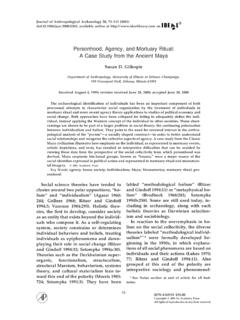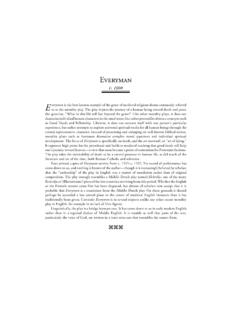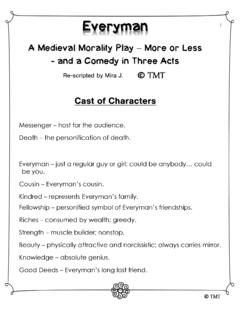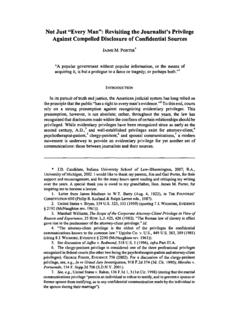Transcription of F. Kafka, Everyman - users.clas.ufl.edu
1 3/7/12 7:50 AMF. Kafka, Everyman by Zadie Smith | The New York Review of BooksPage 1 of 6 Kafka, EverymanJULY 17, 2008 Zadie SmithThe Tremendous World I Have Inside My Head: Franz Kafka: A Biographical Essayby Louis Begley Atlas and Co., 221 pp., $ to describe Kafka, the man? Like this, perhaps:It is as if he had spent his entire life wondering what he looked like, without everdiscovering there are such things as naked man among a multitude who are mind living in sin with the soul of was a then again, using details of his life, as found in Louis Begley s refreshingly factual TheTremendous World I Have Inside My Head: Franz Kafka: A Biographical Essay: over sixfeet tall, handsome, elegantly dressed; an unexceptional student, a strong swimmer, anaerobics enthusiast, a vegetarian; a frequent visitor to movie houses, cabarets, all-nightcafes, literary soirees and brothels; the published author of seven books during his brieflifetime; engaged three times (twice to the same woman).
2 Valued by his employers,promoted at this last Kafka is as difficult to keep in mind as the Pynchon who grocery-shops andattends baseball games, the Salinger who grew old and raised a family in Cornish, NewHampshire. Readers are incurable fabulists. Kafka s case, though, extends beyond literarymystique. He is more than a man of mystery he s metaphysical. Readers who areparticularly attached to this supra-Kafka find the introduction of a quotidian Kafka hard to3/7/12 7:50 AMF. Kafka, Everyman by Zadie Smith | The New York Review of BooksPage 2 of 6 And vice versa. I spoke once at a Jewish literary society on the subject of time inKafka, an exploration of the idea as the critic Michael Hofmann has it that it is almostalways too late in Kafka.
3 Afterward a spry woman in her nineties, with a thick Old Worldaccent, hurried across the room and tugged my sleeve: But you re quite wrong! I knewMr. Kafka in Prague and he was never late. Recent years have seen some Kafka revisionism although what s up for grabs is not thequality of the work,2 but rather its precise nature. What kind of a writer is Kafka? Aboveall, it s a revision of Kafka s biographical aura. From a witty essay of this kind, by theyoung novelist and critic Adam Thirlwell:It is now necessary to state some accepted truths about Franz Kafka, and Kafka s work lies outside literature: it is not fully part of the history ofEuropean fiction. He has no predecessors his work appears as if from nowhere andhe has no true These fictions express the alienation of modern man; theyare a prophecy of a) the totalitarian police state, and b) the Nazi Holocaust.
4 His workexpresses a Jewish mysticism, a non-denominational mysticism, an anguish of manwithout God. His work is very serious. He never smiles in It is crucialto know the facts of Kafka s emotional life when reading his fiction. In some sense, allhis stories are autobiographical. He is a genius, outside ordinary limits of literature,and a saint, outside ordinary limits of human behaviour. All of these truths, all of them,are blames the banality of the Kafkaesque on Max Brod, Kafka s friend, firstbiographer, and literary executor, in which latter capacity he defied Kafka s will (Kafkawanted his work burned), a fact that continues to stain Brod, however faintly, with badfaith. For his part, Brod always maintained that Kafka knew there would be no bonfire: ifhis friend were serious, he would have chosen another executor.
5 Far harder to defend isBrod s subsequent decision to publish the correspondence,4 the diaries, and the acutelypersonal Letter to My Father (though posthumous literary morality is a slippery thing: ifwhat is found in a drawer is very bad, the shame of it outlives both reader and publisher;when it s as good as Letter to My Father, the world winks at it).If few readers of Kafka can be truly sorry for the existence of the works Kafka hadconsigned to oblivion, many regret the way Brod chose to present them. The problem is notsolely Brod s flat-footed interpretations, it s his interventions in the texts themselves. Forwhen it came to editing the novels, Brod s sympathy for the theological would seem to3/7/12 7:50 AMF. Kafka, Everyman by Zadie Smith | The New York Review of BooksPage 3 of 6 guided his hand.
6 Kafka s system of ordering chapters was often unclear, occasionallynonexistent; it was Brod who collated The Trial in the form with which we are familiar. If itfeels like a journey toward an absent God so the argument goes that s because Brodplaced the God-shaped hole at the end. The penultimate chapter, containing the pseudo-haggadic parable Before the Law, might have gone anywhere, and placing it anywhereelse skews the trajectory of ascension; no longer a journey toward the supremeincomprehensibility, but a journey without destination, into which a mystery is thrust andthen succeeded by the quotidian once course, there s also the possibility that Kafka would have placed this chapter near theend, exactly as Brod did, but lovers of Kafka are not inclined to credit him with Brod svariety of common sense.
7 The whole point of Kafka is his uncommonness. Whatever Brodexplains, we feel sure Kafka would leave unexplained; whichever conventionalinterpretation he foists on the works, the works themselves repel. We think of Shakespearethis way, too: a writer sullied by our attempts to define him. In this sense the idea of aliterary genius is a gift we give ourselves, a space so wide that we can play in it again:It is important, when reading Kafka, not to read him too this passage from Brod s 1947 biography: It is a new kind of smile thatdistinguishes Kafka s work, a smile close to the ultimate things a metaphysical smileso to speak indeed sometimes when he used to read out one of his tales for us friendsof his, it rose above a smile and we laughed aloud.
8 But we were soon quiet again. It isno laughter befitting human beings. Only angels may laugh this Angels! It isoften underestimated, how much talent is required to be a great reader. And Brod wasnot a great reader, let alone a great Maybe we can say instead that Brod was a great Of his own literarycapacities, Brod had few illusions. His friendship with Kafka was monstrously one-sidedfrom the start, a thing carved from pure awe. They met after a lecture on Schopenhauer andNietzsche, given by Brod, after which Kafka approached the lecturer and accompanied himhome. Something seems to have attracted him to me, writes Brod. He was more openthan usual, beginning the endless walk home by disagreeing strongly with my all too roughformulations.
9 The familiar pilgrim s pose, two steps behind the prophet, catching wisdomas it These days we tire of Brod s rough formulations: for too long they set the don t want to read Kafka Brodly anymore, as the postwar Americans did so keenly. It s3/7/12 7:50 AMF. Kafka, Everyman by Zadie Smith | The New York Review of BooksPage 4 of 6 to think, had we ourselves been those first readers, that we would have recognizedat once without such heavy prompting the literary greatness of an ex-ape talking to theacademy or tiny Josephine piping for her mouse people. I exists a second Brod account of Kafka reading aloud:We friends of his laughed quite immoderately when he first let us hear the first chapterof The Trial. And he himself laughed so much that there were moments when hecouldn t read any further.
10 Astonishing enough, when you think of the fearfulearnestness of this the crime of Kafka s first biographer is rather benign: a slight overdose of literaryrespect. Brod couldn t quite believe that Kafka was being funny when he was being how could Kafka, in his fearful earnestness, be funny? But it s strange: Kafkarevisionism is also, after a fashion, in love with Kafkaesque purity. We can t credit theBrodish idea that Kafka writes of the alienation of modern man too obvious. And howcould Kafka be obvious? How could Kafka be anything that we are? Even ourdemystifications of Kafka are full of if we re not to read Kafka too Brodly, how are we to read him? We might do worsethan read him Begley. Gently skeptical of the biographical legend, Begley yet believes inthe metaphysical smile of the work, the possibility that it expresses our modern alienation here prophet Kafka and quotidian Kafka are not in conflict.



















